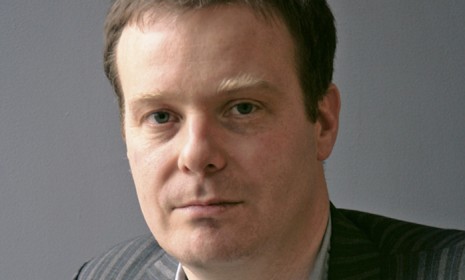Tom McCarthy's 6 favorite books about nothing
The novelist and conceptual artist names six novels that he considers riveting even though, in each one, "nothing happens"

A free daily email with the biggest news stories of the day – and the best features from TheWeek.com
You are now subscribed
Your newsletter sign-up was successful
Jealousy by Alain Robbe-Grillet (Grove, $14.50). We move, repeatedly, through a house on a tropical plantation, watching a table being laid, a centipede being crushed, a woman combing her hair. These actions never run their course: They loop, incessantly — and as they do, the tension mounts. Will there be a murder? Has there been one already? Yes. And no. And yes again.
Ulysses by James Joyce (Simon & Brown, $15). A man buys offal for his breakfast, visits a newspaper office, a restaurant, a brothel; another man paces a beach; a woman gets her period; a scrap of paper floats downriver. And at the same time, Odysseus is reunited with Penelope, all of history is compressed into a single day, and Western literature surges toward its apotheosis.
The Unnameable by Samuel Beckett (Grove, $16). The counterpoint and, perhaps, only possible response to Ulysses: Identity, time, and words themselves all slip away into a void of silence.
The Week
Escape your echo chamber. Get the facts behind the news, plus analysis from multiple perspectives.

Sign up for The Week's Free Newsletters
From our morning news briefing to a weekly Good News Newsletter, get the best of The Week delivered directly to your inbox.
From our morning news briefing to a weekly Good News Newsletter, get the best of The Week delivered directly to your inbox.
Exercises in Style by Raymond Queneau (New Directions, $13). The minor, fleeting altercation on a bus is retold in 99 different ways, each one deploying a different mode of rhetoric, a different way of seeing and understanding: forensic, poetic, auditory, even olfactory. Playful, witty, and ingenious, Exercises in Style acknowledges, and ultimately celebrates, the impossibility of absolute objective testimony, in the novel as in life.
Malina by Ingeborg Bachmann (Holmes & Meier, $16). A Viennese woman cooks dinner for her lover, waits by the telephone, delays embarking on a trip or writing the book she's meant to write. And in that null-time, the abyss of 20th-century trauma yawns wide open and engulfs her.
The Castafiore Emerald by Hergé (Little, Brown, $11). Is it, strictly speaking, a novel? Who cares? It's a total masterpiece. Set in a manor house in which a broken step keeps tripping people up, a pianist practices scales on a loop, a jewel is "stolen" (then found, then lost again), and everyone misunderstands everyone else, this book takes narrative right to its degree zero. Nothing happens in it; it says nothing. Which, of course, creates the perfect blind spot in which a hundred events can take place, and everything can be said.
—Tom McCarthy is the author of Remainder, C, and Men in Space, the last of which has just been published in the U.S.
A free daily email with the biggest news stories of the day – and the best features from TheWeek.com
-
 The ‘ravenous’ demand for Cornish minerals
The ‘ravenous’ demand for Cornish mineralsUnder the Radar Growing need for critical minerals to power tech has intensified ‘appetite’ for lithium, which could be a ‘huge boon’ for local economy
-
 Why are election experts taking Trump’s midterm threats seriously?
Why are election experts taking Trump’s midterm threats seriously?IN THE SPOTLIGHT As the president muses about polling place deployments and a centralized electoral system aimed at one-party control, lawmakers are taking this administration at its word
-
 ‘Restaurateurs have become millionaires’
‘Restaurateurs have become millionaires’Instant Opinion Opinion, comment and editorials of the day